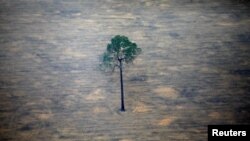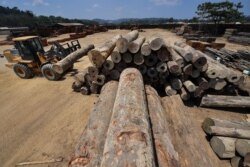Deforestation has wiped out 8% of the Amazon rainforest in just 18 years, according to a study released Tuesday.
The swath of land destroyed between 2000 and 2018 is the size of Spain, according to a study by Amazon Geo-Referenced Socio-Environmental Information Network (RAISG).
"The Amazon is far more threatened than it was eight years ago," RAISG said in a statement.
The organization’s last map tracking deterioration of the forest was published in 2012.
The current map, a collaboration between 10 organizations, shows 513,016 square kilometers of the rainforest have been lost since 2000.
According to the report, the latest data shows a turn for the worse. While rates of deforestation declined between 2003 and 2010, logging, farming, ranching, mining and infrastructure projects in the past decade have negatively affected the Amazon.
Brazilian President Jair Bolsonaro has encouraged development in the Amazon rainforest and loosened enforcement of environmental laws.
"In 2018 alone, 31,269 square kilometers of forest were destroyed across the Amazon region, the worst annual deforestation since 2003," the RAISG study says.
The destruction of mature tropical forests is a massive hit to biodiversity and is responsible for about 8% of global carbon dioxide emissions, according to the World Resources Institute, the research and advocacy group that oversees Global Forest Watch.
Because forests are massive sponges of carbon dioxide, reversing their loss would play an outsize role in fighting climate change.
The RAISG study comes days before the fifth anniversary of the Paris Agreement, in which 195 countries agreed to measures that would limit world production of CO2 emissions. In a controversial move, President Donald Trump withdrew the United States from the agreement in 2017.







